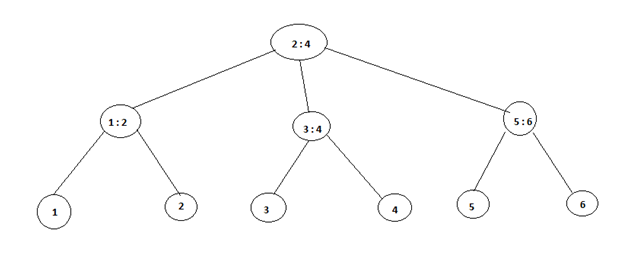Home »
Algorithms
2 – 3 Trees Algorithm
In this article, we will learn the concept of 2 – 3 trees with its algorithm.
Submitted by Shivangi Jain, on July 29, 2018
2 – 3 Trees
A 2 – 3 trees also known 3 – 2 trees is a tree in which each vertex, except leaf has 2 or 3 sons and one or two keys per node, and every path from the root to leaf is of the same length. The tree consisting of a single vertex is a 2 – 3 trees.
Let T be a 2 – 3 trees of height h. The number of vertices of T is between (2^h+1 - 1) and (3^h+1 - 1)/2, and the number of leaves is in between 2^h and 3^h.
Inserting a key K into a B tree T of height h is done in a single pass down the tree, requiring O (h) disk accesses. The CPU time required is O (th) = O (t log n). the B tree insert procedure uses B tree split child to guarantee that the recursion never descends to a full node.

2 - 3 Trees
Algorithm
1. B tree insert (T, K)
2. r = root [T]
3. if n[r] = 2t – 1
4. then s = ALLOCATE – NODE ()
5. root [T] = s
6. leaf [s] = FALSE
7. n [s] = 0
8. c1 [s] = r
9. B – TREE – SPLIT – CHILD (s, 1, r)
10. B – TREE – INSERT – NONFULL (s, k)
11. Else
12. B – TREE – INSERT – NONFULL (r, k)
The lines 4 to 10 deals with the case in which the root node r is full – the root is split and a new node s (having two children) becomes the root. Splitting the root is the only way to increase the height of a B tree. Unlike a binary search tree, a B tree increases in height at the top instead of at the bottom. Afterwards, the procedure finishes by calling B – TREE – INSERT – NONFULL to perform the insertion of key k in the tree rooted at the non-full root node. B – TREE – INSERT – NONFULL recurses as necessary down the tree, at all times guaranteeing that the node to which it recurses is not full by calling B – TREE- SPLIT – CHILD as necessary.
B – TREE – INSERT – NONFULL inserts a key K into the node x, which is assumed to be non-full when the procedure is called. The operation of B – TREE – INSERT and the recursive operation of B – TREE – INSERT – NONFULL guarantees that this assumption is true.
Algorithm
1. B – TREE – INSERT – NONFULL (x, k)
2. i = n [x]
3. If leaf [x]
4. Then while i>= 1 and k< key(i) [x]
5. Do key(i+1)[x] = key (i) [x]
6. i = i – 1
7. key (i+1) [x] = k
8. n[x] = n[x] + 1
9. DISK_ WRITE (x)
10. Else while i>= 1 and K < key (i)[x]
11. Do i = i – 1
12. i = i + 1
13. DISK _ READ (c(i)[k])
14. If n [c(i)[x]] = 2t - 1
15. Then B – TREE – SPLIT – CHILD (x, I, c(i)[x])
16. If k> key (i)[x]
17. Then i = i + 1
18. B – TREE – INSERT – NONFULL (c(i)[x], k)
References:
Advertisement
Advertisement